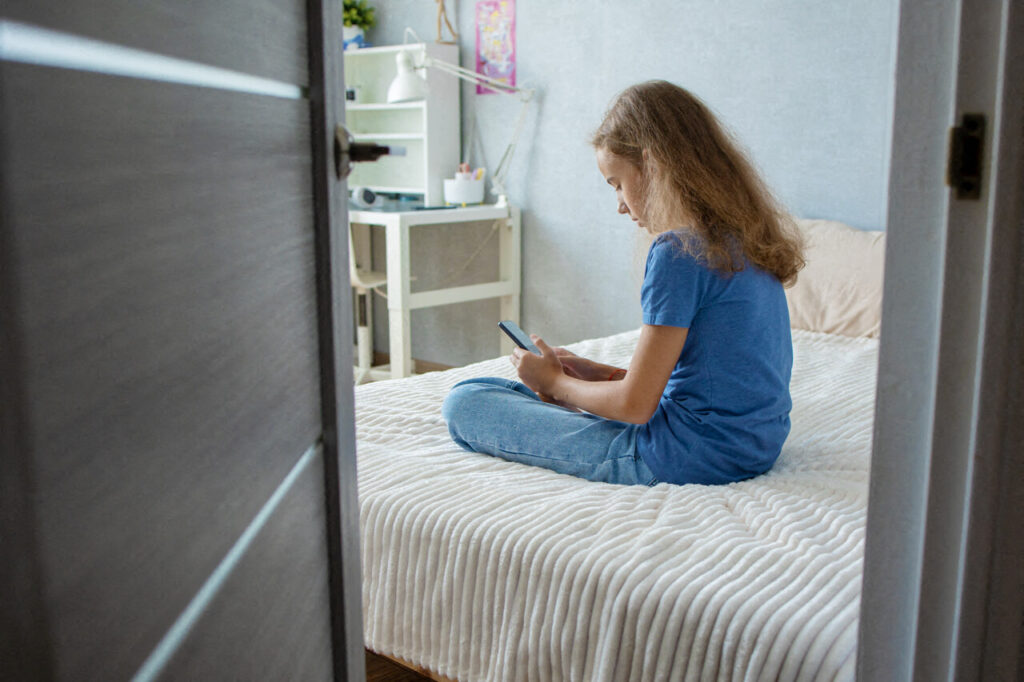By Laurene Fertin
Published on
25 Apr 24 at 7:46 p.m.
See my news
“Parents, the authority is you! You can search your child’s phone (…) to protect him.” In front of the “youth delinquency”current spearhead of the government, the Secretary of State for Citizenship and the City Sabrina Agresti-Roubachemade some proposals.
And that, in particular, of having a right of inspection as parents about the activities that take place inside the smartphones of their children and adolescents. “Something that has struck me in recent years is to think that a teenager has a private life“, was surprised Sabrina Agresti-Roubache on the set of TelematinTuesday April 23, 2024.
The injunction “to meddle” in the affairs of our offspring is expressly required. But it raises questions educational and moral (littletdo we do this?), but also legal (do we have the right to do that?). What should we remember?
What the law says ?
“The law repeatedly enshrines the principle of respect for private life,” begins Marine de la Clergerie, lawyer specializing in digital law, joined by actu.fr :
- In the Civil Code in article 9: “Everyone has the right to respect for their private life”;
- In the Penal Code in articles 226-1 to 226-32: “The act, by means of any means whatsoever, of deliberately infringing on the privacy of life is punishable by one year of imprisonment and a fine of 45,000 euros. privacy of others” for example “by capturing, recording or transmitting, without the consent of their author, words spoken in a private or confidential capacity”;
- In the International Convention on the Rights of the Child which reminds, section 16 that “no child will be the subject of arbitrary or illegal interference in his private life, his family, his home or his correspondence, nor of illegal attacks on his honor and reputation”.
If we refer to the legal texts, interfering with the smartphones of our children and adolescents is, a priori, forbidden. But the legislation also enshrines another principle: that of parents' duty of safety towards their offspring.
“Not the necessary maturity”
“We must still protect children from the risks they may encounter,” agrees Marine de la Clergerie, because “the right to privacy also depends on the age of the children and their maturity,” she adds. She.
Article 371-1 of the Civil Code makes this clear: “parents have a duty of safety”, supports the specialist.
(Parental authority) belongs to the parents until the majority or emancipation of the child to protect him in his security, his health, his private life and his morality, to ensure his education and allow his development, in the respect due to his person.
If the child has a cell phone in primary school, “he doesn’t have not the necessary maturity to know what is good or not good – especially when we know that age control is not effective, for example, on pornographic sites,” explains Marine de la Clergerie.
In other words, looking through your child's cell phone is not not prohibited from the moment when an obligation of protection towards him arises. “ Awareness work However, it is necessary to consider the risks that we may encounter,” indicates the lawyer.
For example, few children or adolescents know that relaying a video of a person being beaten is an illegal act, punishable by law.
“A form of violent intrusion”
If the law confers the right to be able to look at the phones of children and teenagers to parents – in order to ensure their security – it remains to be seen how this activity is perceived by those concerned. Especially when they have not been concerted.
” It is a form of violent intrusion which accentuates the feeling of control and persecution among young people from whom we ask for more and more autonomy and responsibility”, responds to actu.fr Patrick-Ange Raoult, clinical psychologist and member of the National Union of Psychologists (SNJ).
Because the contract of trust between adult and child is broken. Which is not without consequences.
Adolescents are very adept at adopting fine strategies of dissimulation and lies. They will go to other channels to break the rule and find what they are looking for elsewhere.
Set an educational rule with limits
The solution ? “It’s a question of nuances,” says Patrick-Ange Raoult, for whom this must be posed as a educational rule with limits.
“Either it’s the regime of terror (by searching without authorization, Editor’s note.), or we try to build rather responsible young people” by having a deal consented between adults and adolescents on viewing screens.
This is also another element, also important, mentioned in article 371-1 of the Civil Code: “ Parents involve the child in decisions that concern them, depending on its age and degree of maturity. »
Follow all the news from your favorite cities and media by subscribing to Mon Actu.

